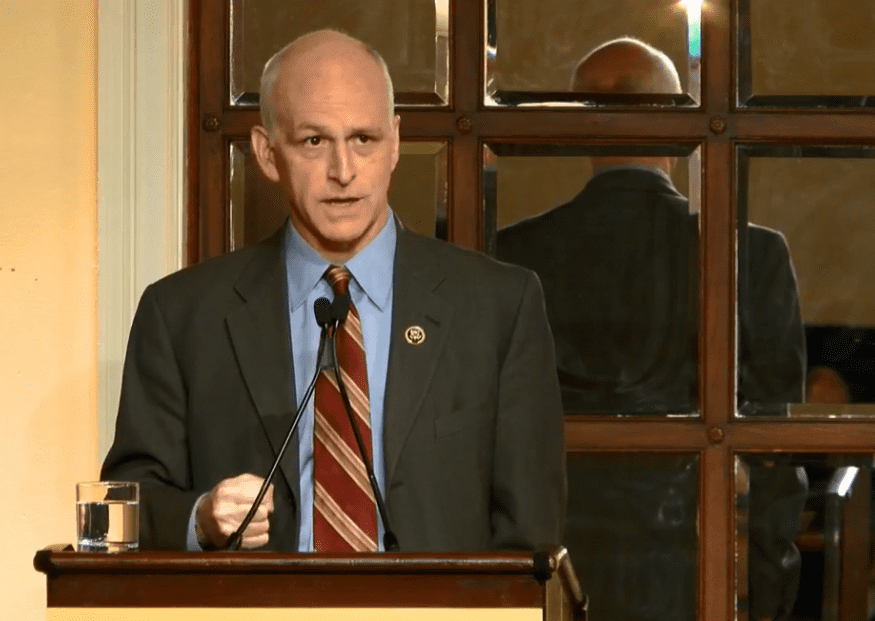
WASHINGTON — The United States does not need intercontinental ballistic missiles to prevent a nuclear attack on its territory, House Armed Services Committee Chairman Adam Smith (D-Wash.) said in a hearing here Wednesday — but a couple rank-and-file Democrats disagreed.
“The problem with them is that they’re identifiable targets,” Smith said of ICBMs from the dais. “And also, I don’t think they’re necessary for deterrence because of the submarines we have.”
Since the November midterm elections that put his party back in control of the House, Smith has said he wants to reduce spending on nuclear arsenal modernization and maintenance. He has also said the U.S. is considering buying too many intercontinental ballistic missiles under the Ground-Based Strategic Deterrent (GBSD) acquisition program. But Wednesday was the first time Smith said in his official capacity that land-based, long-range missiles are not indispensable to U.S. national security.
No committee Republicans agreed with that idea, and even two members of Smith’s own caucus spoke up in support of the 400 deployed Minuteman III missiles set to be replaced by GBSD starting in the 2020s.
“I think the United States should be committed to maintaining and modernizing all three legs of the nuclear triad, and continue to provide an effective and modernized nuclear umbrella for both protection of ourselves and our allies,” Rep. Elaine Luria (D-Va.) said. Luria, a Navy veteran, represents Norfolk, Va., home to the nation’s largest naval base.
Rep. Seth Moulton (D-Mass.) could not quite grasp how the U.S. could prevent an attack on its own intercontinental ballistic missiles if Congress ordered a reduction in their numbers, or forced the White House and the Pentagon into a no-first-use of nuclear weapons pledge.
“The point of having them [intercontinental ballistic missiles] is that it deters an attack, because they are how we respond,” Moulton said. He also wondered aloud how the U.S., absent a first-use option, as sought by some lawmakers, could “deter a pre-emptive attack from an adversary that has a policy of being open to first use.”
The Senate Armed Services Committee, still controlled by the GOP, fully supports the current modernization plan, which the Obama administration agreed to in part to secure Senate consent for the New Strategic Arms Reduction Treaty that limits the U.S. and Russia to 1,550 deployed strategic warheads until at least 2021.
Boeing, which designed the Minuteman III, and Northrop Grumman are maturing competing technical designs for GBSD under three-year Pentagon contracts awarded in 2017 and respectively worth about $350 million and $330 million.
Any Smith proposal to cut the Minuteman III fleet or scale back the GBSD acquisition could appear in the House’s first draft of the annual National Defense Authorization Act. Last year, the House Armed Services Committee published its version of the annual defense policy bill around May.
Minuteman III missiles use W78 and W87 warheads provided by the National Nuclear Security Administration. The civilian agency is in the early stages of planning a life-extension program for the W78.
Smith, and others who question the value of silo-based intercontinental ballistic missiles, say the weapons are impossible to hide from adversaries, who can easily destroy them with long-range missile of their own. These skeptics often note that ballistic-missile submarines, which also carry long-range nuclear missiles, are much safer from attack and nearly always available to threaten a massive counterattack to an adversary’s first strike.
Supporters of the Minuteman III fleet and GBSD say the sheer number of these silo-based missiles discourages foes from hitting the U.S. with nukes out of the blue. An adversary weighing a first strike, these people say, would have to either destroy all the Minuteman III missiles in its initial salvo — something that would deplete much of the enemy’s nuclear arsenal — or risk a Minuteman counterattack.
Skeptics like Smith turn that argument around, saying the need to strike the Minuteman III silos first means that a nuclear-armed enemy considering war against the U.S. will feel more rather than less urgency to launch a nuclear first strike, possibly in the belief that there is no chance of beating the U.S. while any Minuteman III missile can still fly.
Only Russia’s intercontinental ballistic missile fleet is currently large enough to wipe out the entire Minuteman III fleet, groups including the nonprofit Federation of American Scientists estimate.
There will soon be further debate on the issue in the House, Smith all but promised at the close of Wednesday’s hearing. Gen. John Hyten, commander of U.S. Strategic Command, is scheduled to testify soon before the chamber’s Armed Services Committee, Smith said. The committee had not scheduled that testimony at deadline Friday for Nuclear Security & Deterrence Monitor.